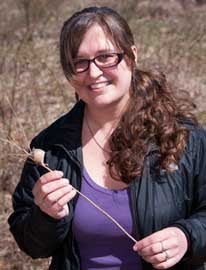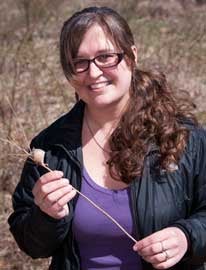 KINGSTON, R.I. – April 18, 2014 – University of Rhode Island doctoral student Jamie Rafter has set the bar quite high for herself. The first research paper she ever wrote has won an award from the Royal Entomological Society as the best research paper published in the last two years in its journal Ecological Entomology.
KINGSTON, R.I. – April 18, 2014 – University of Rhode Island doctoral student Jamie Rafter has set the bar quite high for herself. The first research paper she ever wrote has won an award from the Royal Entomological Society as the best research paper published in the last two years in its journal Ecological Entomology.
The award includes a check for £600 ($1,000) and a trip to the society’s conference in York, England in August.
“When I heard about the award, I just couldn’t stop saying ‘Oh, my god.’ I was squealing with excitement,” said Rafter, 28, who works under the guidance of Associate Professor Evan Preisser. “I wouldn’t call what I do earth-shattering – it’s not going to change the world – so I never expected this.”
Her paper was selected as the Editor’s Choice when it was published in January 2013, and it was the journal’s third most-downloaded paper of the year.
“I don’t know the process of how they pick the best, and I didn’t apply for it, so I was very shocked to find out that I won,” said Rafter, a native of Scranton, Penn., who now lives in Wakefield.
The paper examined an unusual predatory behavior exhibited by the Chinese mantid, a large insect that the URI student describes as “beautiful and charismatic.” Introduced to the U.S. from China in the 1890s, the mantid has established a population at URI’s East Farm, where she first learned about the behavior.
According to Rafter, Chinese mantids eat monarch caterpillars by first gutting their prey, a behavior exhibited by few other insects. The monarchs contain toxins they acquire from eating milkweed plants as a defense against being eaten by predators.
“The Chinese mantid starts feeding while the caterpillars are still alive, and as they do, they break into the body and the gut material starts popping out,” she explained. “They don’t eat the guts, and they make no effort to go back and eat it later, as if they don’t want anything to do with it. But when they ate other caterpillars we tested, they ate them in their entirety, including the guts.”
Rafter had speculated that the behavior may have been an effort to avoid the caterpillar’s toxicity, but a lab study she conducted found that the gut and body tissues of the caterpillar have similar concentrations of toxins. Her findings suggest that the mantids may be less sensitive to the toxins found in the body tissues than in the gut, so they may gut the monarchs to reduce their toxic exposure. She said that the mantid may also be selectively eating the body tissue because it contains higher nutritional value than the gut tissue.
Rafter is continuing her research on the Chinese mantis and expects to graduate from URI with a doctorate in May 2015. She then hopes to become a college professor.
“I really enjoy teaching, but I love research,” she said. “I see myself at a small liberal arts school, working with undergraduates to get them interested in this type of research and then sending them off to grad school.”
Marketing & Communications photo by Michael Salerno Photography.

